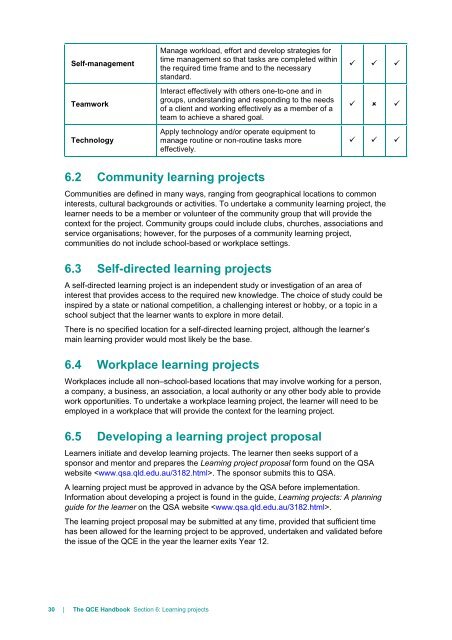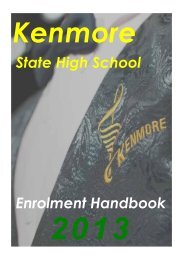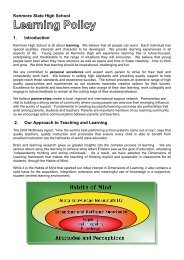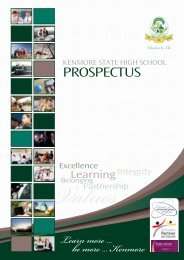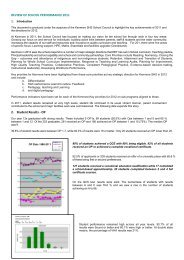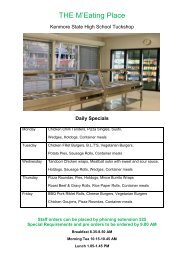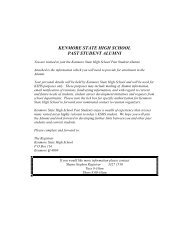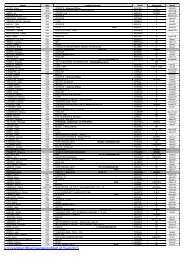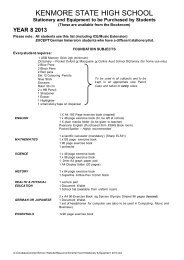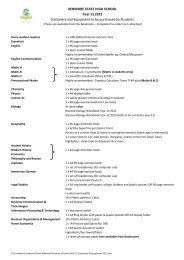QCE Handbook - Queensland Studies Authority
QCE Handbook - Queensland Studies Authority
QCE Handbook - Queensland Studies Authority
Create successful ePaper yourself
Turn your PDF publications into a flip-book with our unique Google optimized e-Paper software.
Self-management<br />
Teamwork<br />
Technology<br />
30 | The <strong>QCE</strong> <strong>Handbook</strong> Section 6: Learning projects<br />
Manage workload, effort and develop strategies for<br />
time management so that tasks are completed within<br />
the required time frame and to the necessary<br />
standard.<br />
Interact effectively with others one-to-one and in<br />
groups, understanding and responding to the needs<br />
of a client and working effectively as a member of a<br />
team to achieve a shared goal.<br />
Apply technology and/or operate equipment to<br />
manage routine or non-routine tasks more<br />
effectively.<br />
6.2 Community learning projects<br />
<br />
<br />
<br />
Communities are defined in many ways, ranging from geographical locations to common<br />
interests, cultural backgrounds or activities. To undertake a community learning project, the<br />
learner needs to be a member or volunteer of the community group that will provide the<br />
context for the project. Community groups could include clubs, churches, associations and<br />
service organisations; however, for the purposes of a community learning project,<br />
communities do not include school-based or workplace settings.<br />
6.3 Self-directed learning projects<br />
A self-directed learning project is an independent study or investigation of an area of<br />
interest that provides access to the required new knowledge. The choice of study could be<br />
inspired by a state or national competition, a challenging interest or hobby, or a topic in a<br />
school subject that the learner wants to explore in more detail.<br />
There is no specified location for a self-directed learning project, although the learner’s<br />
main learning provider would most likely be the base.<br />
6.4 Workplace learning projects<br />
Workplaces include all non–school-based locations that may involve working for a person,<br />
a company, a business, an association, a local authority or any other body able to provide<br />
work opportunities. To undertake a workplace learning project, the learner will need to be<br />
employed in a workplace that will provide the context for the learning project.<br />
6.5 Developing a learning project proposal<br />
Learners initiate and develop learning projects. The learner then seeks support of a<br />
sponsor and mentor and prepares the Learning project proposal form found on the QSA<br />
website . The sponsor submits this to QSA.<br />
A learning project must be approved in advance by the QSA before implementation.<br />
Information about developing a project is found in the guide, Learning projects: A planning<br />
guide for the learner on the QSA website .<br />
The learning project proposal may be submitted at any time, provided that sufficient time<br />
has been allowed for the learning project to be approved, undertaken and validated before<br />
the issue of the <strong>QCE</strong> in the year the learner exits Year 12.


